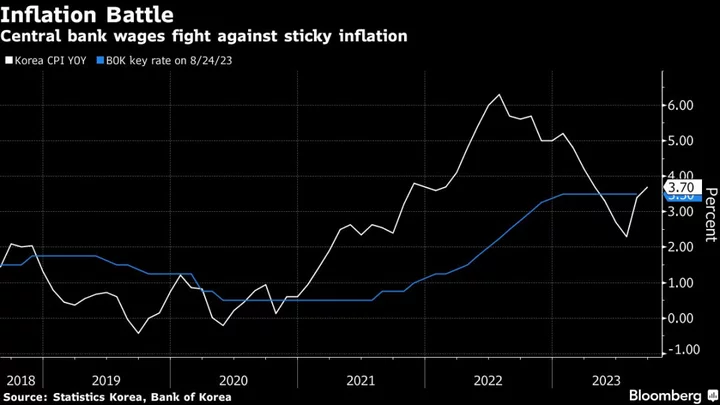The Bank of Korea is poised to hold its benchmark interest rate steady as it seeks to quell a resurgence in household debt while also preserving economic momentum.
All 18 economists surveyed by Bloomberg expect South Korea’s central bank to keep the rate at 3.5% when the board convenes on Thursday. It would be the sixth consecutive hold since authorities last hiked in January.
The meeting comes as the crisis in the Middle East threatens to boost oil prices and exacerbate global inflationary pressure. Domestically, private loans are increasing again as housing prices rebound, alarming policymakers who consider high household debt levels a major long-term risk for economic growth.
Household debt hit a record 1,079.8 trillion won ($798 billion) as of the end of September as mortgages rose by the most since February 2020, according to central bank data. BOK Governor Rhee Chang-yong has urged potential home buyers to be aware that rates could stay high for longer than expected.
What Bloomberg Economics Says...
“We expect a shift away from its tight stance in the second quarter of 2024. But if the debt continues to grow unchecked, the BOK could delay its pivot.”
— Hyosung Kwon, economist
To read the full report, click here
The board is in lockstep with Rhee over the need to deter asset bubbles and avoid financial imbalances at a time when consumer inflationary pressure persists. Its members have been unanimous in warning for months that they’re ready to take the rate higher by another quarter-percentage-point if deemed necessary.
Markets are increasingly skeptical that it will come to pass. Another hike would put more pressure on credit markets still recovering from a series of crises that included the default of a Legoland Korea developer last year and a bank run at a local credit union in the summer. At the same time, the outlook for economic growth remains precarious as exports have yet to return to growth, and industrial output is still shaky.
“The lack of a dissenting vote for a hike so far leaves us skeptical of a strong consensus and willingness to take action,” Kathleen Oh, an economist at Morgan Stanley Asia Ltd, said in a note. “Amid fading growth momentum, we think the macro environment is even less conducive for a further hike now.”
There’s also growing public unease about mounting interest rate loads for households and companies. In a cabinet meeting last week, President Yoon Suk Yeol cited “interest burdens” as he spoke of jitters in global financial markets and their potential impact on Korean rates in the aftermath of the Hamas attack on Israel.
“High inflation and the increases of interest burdens will bring about a reduction in people’s real income and exert a negative influence on the economic recovery momentum,” he said, according to a transcript released by his office.
The impact on oil prices from the conflict remains limited so far. But Rhee said in an interview with Bloomberg TV last week that if the conflict were to widen, and the oil price were to jump above the mid-$80 range, it would prompt the bank to readjust its growth outlook for next year.
The BOK expects Korean economic growth to accelerate to 2.2% in 2024, versus the 1.4% forecast for this year. Growth prospects are increasingly becoming a focus for the BOK, Rhee has suggested, even as he’s made it clear the primary policy objective remains fighting inflation. Price growth briefly cooled at the start of the summer to the targeted 2% level, before a resurgence in August and September.
The BOK began its tightening cycle in August 2021, launching its fight against inflation earlier than peers including the Federal Reserve. Some economists say the BOK may ultimately jump ahead of the Fed once again — in the opposite direction, reducing rates in the event financial and economic concerns continue to mount.
“A prolonged period of elevated interest rates may increase financial stress to the point at which firms and households are unable to sustain their economic activity,” Jeong Woo Park, a Korea economist at Nomura Holdings Inc., said in a note. “Both households and nonfinancial corporate sectors are nearing that point.”
--With assistance from Tomoko Sato.
(Corrects affiliation of economist in seventh paragraph of a story that was published on Oct. 18.)

